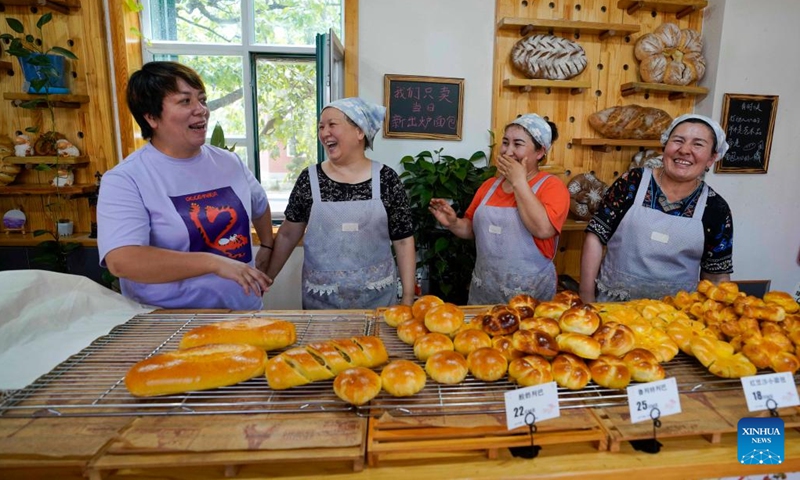Xinjiang residents send emails to UN human rights chief to tell truth of region, dismiss West's rumor campaign

Feng Xiaoli (1st L), owner of the Liuba Bakery, chats with her employees at the bakery in Yining City, northwest China's Xinjiang Uygur Autonomous Region, June 23, 2022. Located at a commercial area of Liuxing Street in Yining City, Liuba Bakery is well known for its quality bread. Besides, it has provided job opportunities for local women to increase their income.(Photo: Xinhua)
Recently, many residents from China's Xinjiang region voluntarily sent emails to UN human rights chief Michelle Bachelet to share the true situation in the region and debunk lies made by anti-China forces from the US and other Western countries that smear the region, the Global Times learned from the Xinjiang regional government.
Residents from Xinjiang who wrote emails to Bachelet ranged from victims of terror attacks to former trainees at vocational education and training centers, as well as religious leaders, scholars and migrant workers from the region, and they expressed hopes for the UN High Commissioner to listen to their voices and take an objective view of the region's human rights situation, based on her visit in May.
In May, Bachelet made a visit to China's Xinjiangregion and said in a statement issued at the end of her visit that her team had wide interactions with people from different sectors in the region.
Bachelet's statement clearly disappointed anti-China forces from the US and some Western countries, as they have been hyping "genocide" allegations and smearing the human rights situation in the Xinjiang region. After Bachelet's visit in May, they kept pressuring the UN High Commissioner to release a "full report" on the situation in Xinjiang.
In response to the smear campaign against the Xinjiang region, many residents expressed their anger in their emails to Bachelet, the Global Times has learned from residents. For example, Zaynur Namatqari, a former trainee from a vocational education and training center in Shufu county of Kashi Prefecture, wrote in the email that female trainees' rights had been protected and no one had been assaulted.
"The so-called reports on 'female trainees being sexually assaulted,' 'male trainees being tortured,' or the training centers are 'concentration camps' are lies made by the BBC and other Western media!" said Zaynur.
Some religious leaders, including Abdureqip Tomurniyaz, president of the Islam Association of the Xinjiang Uygur Autonomous Region and principal of the Xinjiang Islamic Institute, also wrote to Bachelet and introduced how the region protects residents' freedom of religion.
"Religious residents can practice their religions in religious venues or in their own houses… the allegation of 'Xinjiang oppressing religious activities' is a smear and a lie," said Abdureqip.
Residents in Xinjiang have witnessed the fundamental changes of the region, from being battered by terrorist attacks to the current stability. Some victims of terror attacks also shared their stories in the emails to Bachelet.
Alimjan Mattohti, who witnessed a terror attack on July 5, 2009, recalled what he saw on that day. "I saw some vehicles near the Yan'an Road Park were set on fire and many people were chased and beaten by rioters… I tried my best to save people… I finally helped 28 people who were severely injured," said Alimjan.
Many experts, scholars and public representatives in Xinjiang have introduced to Bachelet the autonomous region's efforts in documenting and protecting excellent traditional ethnic cultures. As said by Deputy President Zulhayat Ismayil of Xinjiang University in her email, the fine traditional cultures of ethnic minorities are well protected. Ethnic minority languages are extensively used in such areas as the judicial system, administration, education, press and publishing, radio and television, the internet, and public affairs.
Aside from these emails from Xinjiang residents to Bachelet, more than 900 institutions and organizations from all fields of society signed and released an open letter to the UN human rights chief and called on Bachelet to draw a conclusion on the facts and present what she saw and heard in the Xinjiang region to the international community in an objective and fair manner.
For a long time, biased reports on China's Xinjiang region, disinformation and lies made by anti-China forces were widespread and affected many people in the international community, including Bachelet,who were under great pressure if they wanted to call for a fair view of Xinjiang.
"Now, residents from Xinjiang are using their own voices and directly communicating with the outside to display a true Xinjiang," Wang Jiang, an expert at the Institute of China's Borderland Studies at Zhejiang Normal University, told the Global Times.
Wang noted that Bachelet's visit to the Xinjiang region helped break the information barriers set by anti-China forces and let her to see the region with her own eyes. Both the emails to Bachelet and the open letter showed local residents' sincere hope that the UN human rights chief and the international community were not being fooled by anti-China forces or being abducted by politics.
Such true and sincere voices from the Xinjiang region are also a reminder for the UN High Commissioner to take an objective view of the Chinese people, said Wang.
Photos
Related Stories
- People of Different Ethnic Groups in Xinjiang Express Legitimate Concerns through Real-life Experiences in Their Letters to UN High Commissioner for Human Rights
- Direct train to Kashgar set to boost tourism in Xinjiang
- Open letter to UN High Commissioner for human rights
- So-called "Uyghur Forced Labor Prevention Act" reveals hypocrisy of U.S.
- U.S. impedes fair competition by politicizing economic issues
Copyright © 2022 People's Daily Online. All Rights Reserved.









